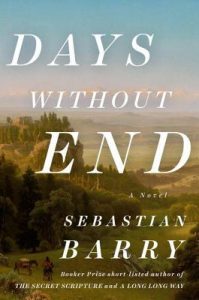Sebastian Barry: Days Without End (October 2025)

Days Without End is in the form of a first person narrative by Thomas McNulty, an Irish émigré to America alone at the age of fourteen.
It encompasses three tragic events, the Irish potato famine, the Indian wars, and the American civil war.
Thomas teams up with another destitute boy, John Cole, and their friendship grows into a lifelong loving relationship.
They find employment working in a dance hall dressed as girls to partner the miners in a small community with no women. The men love their dance evenings and, though fully aware that Thomas and John are boys, treat them with gallantry. Some of the group found this hard to believe although it was true that men at the time did dance together.
When the adolescent boys become young men they regretfully have to part company with their kindly employer and join the army but they keep in touch with him. Later on in the story they join his newly formed minstrel show and perform in a romantic drama with Thomas as the female heroine.
Sebastian Barry always tackles challenging subject matter in his work with great compassion and humanity. The battles and resulting death and injuries accompanied by disease and the hardships endured by the soldiers up against bitter winters, searing hot summers and driving rain are described in such excellent prose as to have a certain poetry. The descriptions of nature and landscapes are also beautifully drawn but the story is harrowing, particularly the massacres of Native American tribes and some of the group found the book too violent and grim.
Others thought that the love between Thomas and John, the quality of the writing, the humour and comic relief mitigated against the horror.
A young Indian girl, Winona, is adopted by the two men and though well-loved and cared for, it was said that she was not given a say and we wanted to learn about how she felt about her losses and the trauma that she had suffered.
Some of us appreciated the narrative and considered it authentic but others missed dialogue. We also disagreed over whether or not Thomas had maintained his Irish lyrical voice.
It was a tough read but it is the job of writers, poets and and artists to bear witness to the harsh realities of war.
3/5
